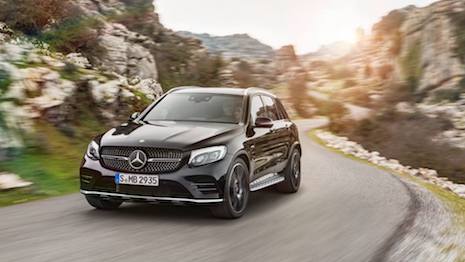- About
- Subscribe Now
- New York,
August 8, 2018

 Mercedes' GLC would cost over 20 percent more if tariffs are implemented. Image credit: Mercedes
Mercedes' GLC would cost over 20 percent more if tariffs are implemented. Image credit: Mercedes
Automakers need to prepare for the impact that possible tariffs may have on sales in the U.S., as a new study finds prospective buyers could consider opting for used cars.
According to a report from Autolist, 65 percent of consumers expect car prices to climb if auto tariffs come to fruition. However, 45 percent of consumers also incorrectly believe that U.S. automakers would not be impacted by tariffs.
"We were most surprised that consumers would choose a used vehicle when faced with tariffs," said David Undercoffler, editor in chief of Autolist, San Francisco. "Rather than waiting on their purchase, buying a less expensive model or trim line or just ignoring them altogether and paying the higher price."
The study is based on a poll of 1,453 current car shoppers in late July to gauge the impact of potential tariffs on their vehicle purchases.
Tariff trouble
Since May, President Donald Trump has publicly contemplated placing heavy duties on imported cars.
The tariffs the president proposed would reach up to 25 percent, placing a significant toll on foreign exporters and the customers in the U.S. who desire foreign cars.
While likely aimed at protecting American interests from cheaper cars manufactured in Asia, tariffs on imported cars would also have an effect on luxury vehicles, many of which are manufactured in Europe (see story).
American-made brands, including Lincoln, would be impacted by tariffs. Image credit: Lincoln
However, tariffs would also impact United States automakers including General Motors, Ford and Fiat Chrysler. Many American-made vehicles include foreign parts, so tariffs would still cause production costs to rise stateside.
According to reports, if automakers choose to pass on increased costs to consumers, prices could rise by up to 20 percent — a difference of thousands of dollars. More than half of respondents, 53 percent, expect carmakers to put the burden of higher production costs on buyers and raise prices.
Tariffs would motivate more buyers to chose pre-owned cars. Image credit: Autolist
Although 22 percent of respondents were unsure what impact tariffs would have on their future car purchases, 15 percent would opt for a cheaper, new vehicle and 9 percent would delay their car purchase.
The most common answer, however, was purchasing a used car instead of a new model. Forty-one percent of car shoppers would choose to purchase a pre-owned vehicle if tariffs increased car costs.
Non-luxury and luxury brands alike have a large market of consumers for secondhand vehicles.
The pre-owned industry offers luxury vehicles at a cheaper price, presenting an opportunity for aspiring luxury owners to purchase a high-end vehicle.
In addition, regulating the pre-owned industry, as opposed to letting used-car lots sell the vehicles, allows for the brands to control the vehicles and ensure their consumers, even the pre-owned consumers, are receiving the best service possible (see story).
"This is a great time to buy a used car since there’s lots of quality inventory on the market," Mr. Undercoffler said.
Political landscape
Evolving automotive regulations in the U.S. and overseas continue to impact the luxury car industry.
The Trump administration has announced a new plan to roll back regulations on emissions for U.S.-made cars in a continued effort to bolster American products over those made in other countries.
Rolling back those regulations would allow cars with higher emissions to be produced and sold. The current regulations demand that automakers continuously improve on fuel efficiency until 2025, a responsibility that can be an expensive effort for brands.
With those rulings rolled back, brands would get some revenue back that they could theoretically use on other pursuits (see story).
Meanwhile, officials in the United Kingdom have come to an agreement on the country's future trade regulations with the European Union.
The decision answers many concerns the auto industry has raised in regards to the U.K. leaving the E.U.
Aston Martin was among the automakers that had hoped to see little to no tariffs introduced that could cause issues for businesses in the U.K. and the E.U., as well as regulatory divergence and “other barriers" (see story).
"All types of vehicles [would] be affected equally [by tariffs]," Autolist's Mr. Undercoffler said. "You could argue that the luxury market and luxe buyers are better positioned to absorb a cost increase than the mass-market consumer."
Share your thoughts. Click here